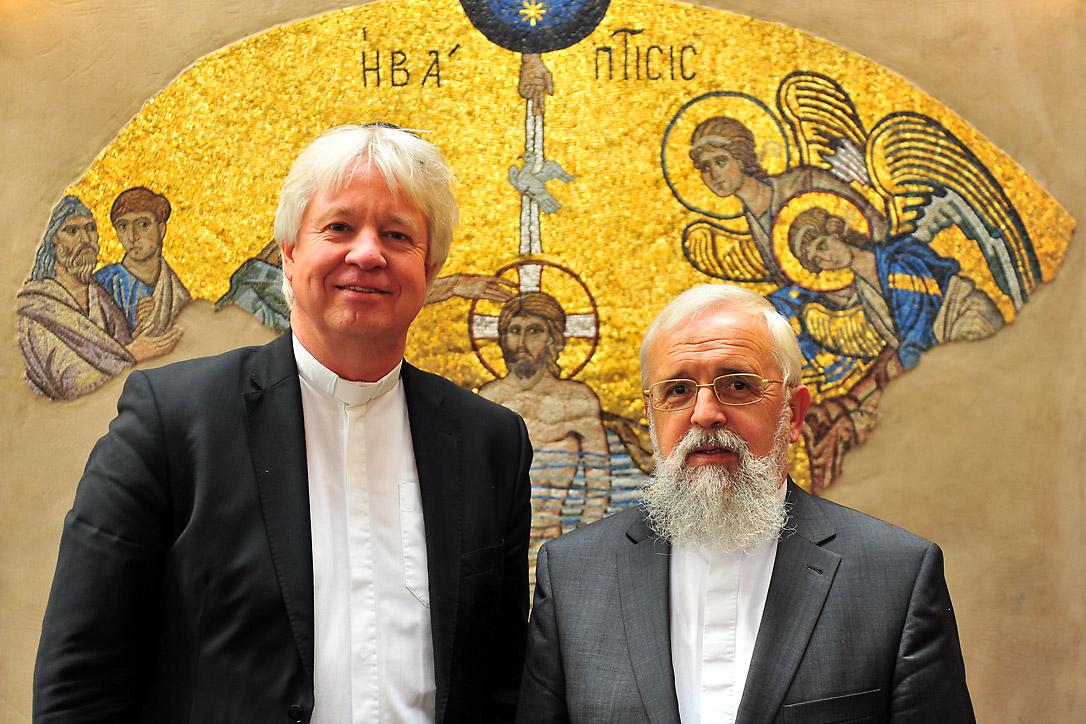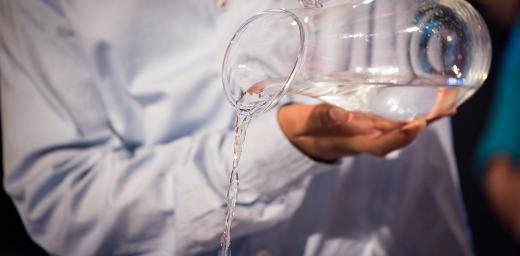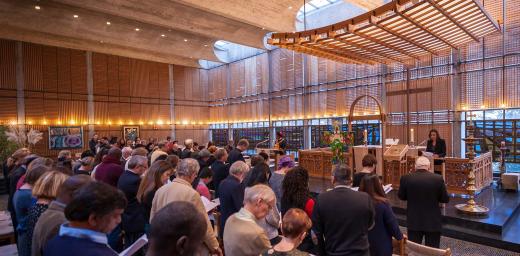Growing mutual trust between Catholics and Lutherans

During a visit to the LWF, German Bishops Dr Karl-Hinrich Manzke (Lutheran) and Dr Gerhard Feige (Catholic) expressed great appreciation for the growing relationships between Lutherans and Catholics globally and locally. Photo: LWF/S. Gallay
German bishops say strong ecumenical and joint diaconal efforts underpin relations
(LWI) – The forthcoming Joint Catholic-Lutheran Commemoration of the Reformation in Sweden “is an ecumenical success story which is based on mutual trust,” said Magdeburg Roman Catholic Bishop Dr Gerhard Feige during a recent visit to The Lutheran World Federation (LWF).
Feige, who is chairperson of the Ecumenical Commission of the German Catholic Bishops’ Conference, said the event on 31 October had shown that “without trust there can be no progress.”
Pope Francis, LWF President Bishop Dr Munib A. Younan and General Secretary Rev. Dr Martin Junge will jointly lead the commemoration’s prayer service in Lund Cathedral and a public gathering at the Malmö arena.
Bishop Dr Karl-Hinrich Manzke, the Commissioner for Catholic Affairs at the United Evangelical Lutheran Church of Germany (VELKD) accompanied Feige on the 6 October visit to the LWF Communion Office. Their discussions with Junge focused on the growing relationships between Lutherans and Catholics at a global level and they shared insights about working together at church level in Germany.
“Ecumenical collaboration is not a strange word for us,” Feige added. He was referring to the eastern part of the country, where Christians worked closely together during the communist regime preceding reunification in 1990 and in a context of secularism.
It is an ecumenical success story which is based on mutual trust.
Manzke, who is bishop of the Evangelical Lutheran Church of Schaumburg-Lippe, said Catholics and Lutherans in the rural areas in the state of Niedersachsen, western Germany, had made good progress in developing curricula for joint religious education to interested students. For five years now, many schools have offered the subject based on common text books and taught in mixed classes of students from Lutheran or Catholic families. “This is a great example of facing the challenges of society together,” he added.
The VELKD official also referred to regular consultations between the church leadership of the Catholic dioceses of Osnabrück and Hildesheim and the four regional Lutheran churches there. These meetings, which have been taking place for 15 years have become a basis for mutual trust among participants, he said.
Social responsibility
Manzke underlined that collaboration between Lutherans, Catholics and other institutions was “a matter of course” when taking on social responsibility. As an example of this shared approach at the local level, he cited support towards refugees arriving in the region.
The Schaumburg-Lippe bishop noted that despite remaining differences in the understanding of the church, ministry, Holy Communion and other issues, the annual joint ecumenical service hosted by Lutherans around Reformation Day in Bückeburg “is celebrated together” and the liturgy includes a remembrance of baptism.
Feige mentioned other concrete examples from the eastern part of Germany such as joint worship services and receptions hosted by Catholics and Protestants since 2015 to discuss the church’s position on political and social issues.
Christians make up around 61 percent of Germany’s population of 80.6 million people, with Catholics and Protestants counting on average 30 percent and 28 percent respectively. In the eastern part—the former German Democratic Republic—less than 20 percent of the population is affiliated to a church or other religious body.
The LWF has 11 member churches in the country, seven of which constitute VELKD.
(LWF intern Felicitas Biehler from Germany, contributed to this article. Editing by LWF Communications.)





